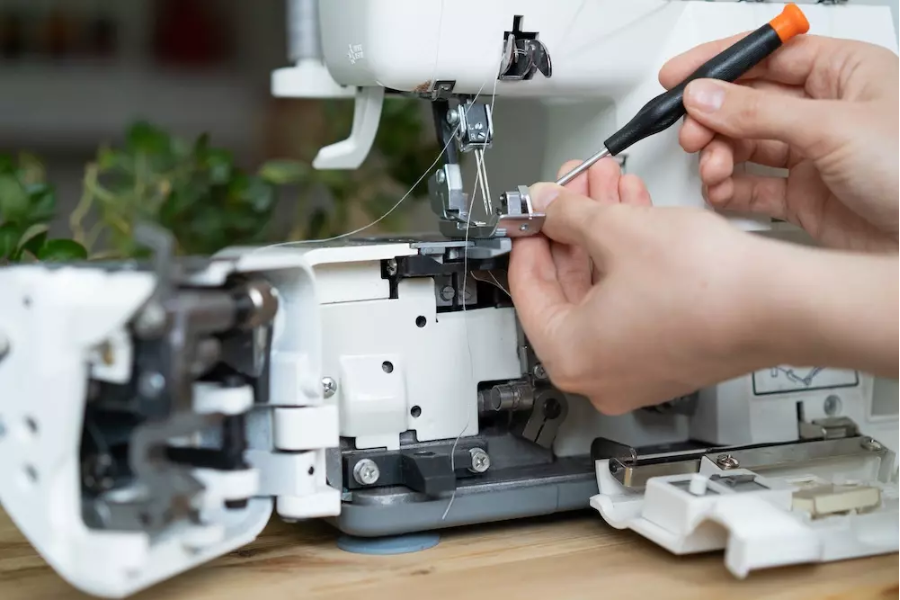Whether you’re an avid crafter, a professional tailor, or someone who occasionally sews as a hobby, your sewing machine is one of your most valuable tools. But like any mechanical device, it can wear out, break down, or need a little TLC over time. That’s when the search for reliable sewing machine repair near you becomes essential.
In this comprehensive guide, we’ll walk you through everything you need to know about getting your sewing machine repaired in the U.S.—from where to look, what to expect, and how to take care of your machine to avoid frequent breakdowns. Let’s dive into the world of sewing machine maintenance and repair
Why Timely Repair Matters
A sewing machine that skips stitches, jams frequently, or makes strange noises is more than just a nuisance—it can interrupt your workflow, damage fabric, or even become a safety risk. Regular use causes gradual wear and tear, and without proper care, even high-end machines can malfunction.
Timely repairs ensure:
- Smooth operation
- Increased machine longevity
- Prevention of bigger, costlier issues
- Accurate and high-quality stitching
Recognizing Common Sewing Machine Issues
Before calling in the pros, it’s helpful to understand some of the most common sewing machine problems. This way, you can explain the issue clearly and possibly avoid unnecessary service charges.
1. Thread Bunching or Bird Nesting
This occurs when the bobbin thread tangles under the fabric, usually caused by improper threading or tension issues.
2. Skipped Stitches
Often the result of a dull needle, incorrect needle size, or timing problems inside the machine.
3. Needle Breakage
May stem from pulling fabric too hard, hitting pins, or using the wrong needle for the fabric.
4. Machine Not Running
Could be due to a faulty power cord, pedal issue, or internal motor failure.
5. Unusual Noises or Grinding
A clear indicator that something inside the machine—gears, bearings, or moving parts—needs attention or lubrication.
Where to Find Sewing Machine Repair Services Near You
Searching for a nearby repair shop may seem daunting, but there are multiple avenues you can explore depending on your machine brand, your location, and your specific needs.
1. Brand-Authorized Service Centers
If your sewing machine is still under warranty or you prefer specialized service, your best bet is an authorized service center. These centers have trained technicians and often access to genuine parts.
Here’s how you can approach this:
- Visit the brand’s official website.
- Use their store or service locator by entering your ZIP code.
- Choose a location that specializes in your machine’s brand.
Whether it’s Brother, Singer, Janome, or Bernina, these manufacturers often have detailed listings of certified technicians across the U.S.
2. Local Independent Repair Shops
Not all repair needs require a trip to a corporate service center. Many small, locally owned sewing machine repair shops offer personalized service, faster turnaround times, and competitive prices.
Benefits of local shops include:
- One-on-one consultations
- Custom service packages
- In-home service for large or industrial machines
- Repairs for multiple brands and vintage models
A quick Google search for “sewing machine repair near me” or browsing platforms like Yelp or local Facebook groups can uncover hidden gems in your town.
3. Mobile Repair Technicians
Some repair professionals offer mobile services, coming to your home or studio. This is especially convenient for large, commercial, or industrial machines that are difficult to transport.
Mobile services are ideal for:
- Schools or classrooms
- Tailoring shops
- Quilting businesses
- Elderly clients or those with mobility issues
Understanding Service Costs
One of the first questions many people ask is, “How much is this going to cost me?”
The price of sewing machine repair can vary widely based on:
- Type of machine (mechanical vs. computerized)
- Brand and model
- Extent of the problem
- Location of the repair service
Here’s a rough breakdown of common pricing:
- Basic Cleaning & Tune-up: $80–$150
- Diagnostic Fee: $25–$50 (often waived if repair is approved)
- Full Repair (with part replacement): $150–$300+
- Hourly Labor (for specialty work): $40–$60/hour
If your machine is vintage or rare, the costs may be higher due to the difficulty in sourcing parts.
What to Expect During the Repair Process
When you bring your machine in for service, the technician will typically start with a diagnostic check. This may include:
- Testing stitch quality
- Examining needle movement and feed dogs
- Checking thread tension
- Inspecting the bobbin case, belts, and motor
- Lubricating internal components
Once the problem is identified, you’ll receive a quote for the repair. Make sure to ask if parts are included and how long the repair will take—some complex issues may require several days, especially if parts need to be ordered.
Questions to Ask Before Choosing a Repair Service
Not all repair shops are created equal. Before handing over your machine, consider asking the following:
- Do you specialize in my machine’s brand and model?
- Are your technicians certified or factory-trained?
- What is the turnaround time?
- Is there a warranty on repairs?
- What does the service fee include?
- Do you provide pick-up and drop-off services?
A reliable repair shop will be transparent with pricing, turnaround times, and their experience with your specific machine.
DIY Repairs: When and When Not to Try It Yourself
If you’re handy and know your way around a screwdriver, some simple maintenance tasks are safe to do at home.
Safe DIY Fixes:
- Replacing the needle
- Cleaning lint from the bobbin case
- Oiling the machine (only if the manual recommends it)
- Adjusting thread tension
Leave It to the Pros If:
- The motor won’t run
- The machine is computerized or embroidery-capable
- You’re unfamiliar with the internal mechanisms
- It involves electrical components
Tampering with advanced systems can void warranties or make the issue worse.
Sewing Machine Brands and Their Repair Nuances
Each brand has its quirks and recommended repair procedures. Here’s a quick glance at some of the most popular ones:
1. Brother
Known for their user-friendly machines, Brother sewing machines often feature computerized systems. Repairs often involve sensor calibration or touchscreen fixes.
2. Singer
One of the oldest and most popular brands in the U.S., Singer machines vary greatly—from vintage mechanical models to modern electronic ones. Make sure the repair shop is comfortable working on older models if you have one.
3. Janome
Janome machines are reliable but often require brand-specific parts. It’s essential to work with a technician who has access to genuine replacements.
4. Bernina
Premium and high-precision, Bernina machines can be pricey to fix but are well worth maintaining. Authorized service centers are best for these models.
Maintenance Tips to Avoid Frequent Repairs
Preventative care can save you money and headaches in the long run. Here are easy habits to incorporate:
1. Clean After Each Project
Use a small brush or vacuum to clean lint around the bobbin area and feed dogs.
2. Change Needles Regularly
Old needles can bend or break and cause uneven stitches or fabric damage. After 6 to 8 hours of sewing, replace them.
3. Oil the Machine (if needed)
Refer to your manual. Some machines require regular oiling; others are self-lubricating and should not be oiled.
4. Use Quality Thread
Cheap thread breaks easily and creates lint, which can clog your machine.
5. Cover When Not in Use
Dust can enter and settle into mechanisms. A simple dust cover keeps things clean.
6. Schedule Yearly Professional Tune-Ups
Even if it seems fine, a professional can spot problems before they become costly repairs.
Final Thoughts
Finding a trustworthy sewing machine repair service near you is crucial to keep your projects on track and your machine running smoothly. Whether you go with a certified service center, a local repair expert, or a mobile technician, make sure you choose someone with the skills, reputation, and experience to treat your machine with care.
Remember, a well-maintained machine can last for decades. With regular cleaning, proper storage, and timely professional servicing, your sewing machine can remain a reliable companion for many years of stitching joy.
Stay updated with the latest business trends and insights on ExecuteBuzz.com.


